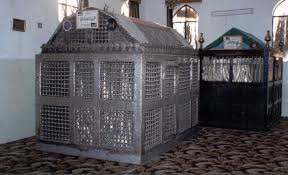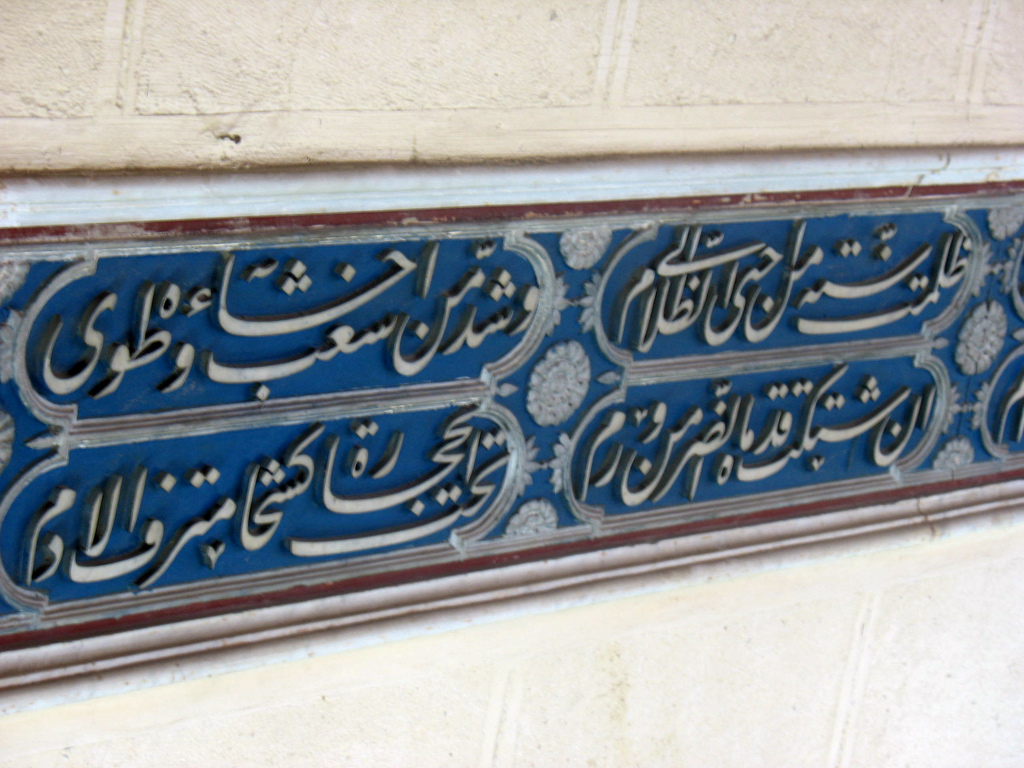|
Muhyadheen Mala
Muhyadheen Mala is an ode of praise for the Muhyadheen Abdul Khadir Al Gilani composed by the poet Khazi Muhammad of Kozhikode four centuries ago. Kerala Muslims celebrated its fourth century completion under cultural department last year. Al-Gilani succeeded the spiritual chain of Junayd Baghdadi. His contribution to thought in the Muslim world earned him the title Muhiyuddin (lit. "The reviver of the faith"), as he along with his students and associates laid the groundwork for the society which later produced stalwarts like Nur ad-Din and Saladin. His Sufi order named after him is generally thought to be one of the most popular Sufi orders of the Islamic world. Popularity of Muhyadheen Mãla Sufi Muslims have traditionally venerated the verses. The poem is memorized and recited in congregation A congregation is a large gathering of people, often for the purpose of worship. Congregation may also refer to: *Church (congregation), a Christian organization meeting in a particu ... [...More Info...] [...Related Items...] OR: [Wikipedia] [Google] [Baidu] |
Abdul-Qadir Gilani
ʿAbdul Qādir Gīlānī, ( ar, عبدالقادر الجيلاني, ʿAbd al-Qādir al-Jīlānī; fa, ) known by admirers as Muḥyī l-Dīn Abū Muḥammad b. Abū Sāliḥ ʿAbd al-Qādir al-Jīlānī al-Baḡdādī al-Ḥasanī al-Ḥusaynī (March 23, 1078February 21, 1166), was a Sunni Muslim preacher, ascetic, mystic, jurist, and theologian belonging to the Hanbali school, and the eponymous founder of the Qadiriyya tariqa (Sufi order) of Sufism.W. Braune, ''Abd al-Kadir al-Djilani, The Encyclopaedia of Islam'', Vol. I, ed. H.A.R Gibb, J.H.Kramers, E. Levi-Provencal, J. Schacht, (Brill, 1986), 69;"authorities are unanimous in stating that he was a Persian from Nayf (Nif) in Djilan, south of the Caspian Sea."John Renard, The A to Z of Sufism. p 142. Juan Eduardo Campo, Encyclopedia of Islam, p. 288. The Qadiriyya tariqa is named after him. He was born on March 23, 1078 (1 Ramdhan 470 AH) in the town of Na'if, Rezvanshahr in Gilan, Iran, and died on February 21, 1166 ( ... [...More Info...] [...Related Items...] OR: [Wikipedia] [Google] [Baidu] |
Kozhikode
Kozhikode (), also known in English as Calicut, is a city along the Malabar Coast in the state of Kerala in India. It has a corporation limit population of 609,224 and a metropolitan population of more than 2 million, making it the second largest metropolitan area in Kerala and the 19th largest in India. Kozhikode is classified as a Tier 2 city by the Government of India. It is the largest city in the region known as the Malabar and was the capital of the British-era Malabar district. In antiquity and the medieval period, Kozhikode was dubbed the ''City of Spices'' for its role as the major trading point for Indian spices. It was the capital of an independent kingdom ruled by the Samoothiris (Zamorins). The port at Kozhikode acted as the gateway to medieval South Indian coast for the Chinese, the Persians, the Arabs and finally the Europeans. According to data compiled by economics research firm Indicus Analytics in 2009 on residences, earnings and investments, Kozhikode w ... [...More Info...] [...Related Items...] OR: [Wikipedia] [Google] [Baidu] |
Kerala
Kerala ( ; ) is a state on the Malabar Coast of India. It was formed on 1 November 1956, following the passage of the States Reorganisation Act, by combining Malayalam-speaking regions of the erstwhile regions of Cochin, Malabar, South Canara, and Thiruvithamkoor. Spread over , Kerala is the 21st largest Indian state by area. It is bordered by Karnataka to the north and northeast, Tamil Nadu to the east and south, and the Lakshadweep Sea to the west. With 33 million inhabitants as per the 2011 census, Kerala is the 13th-largest Indian state by population. It is divided into 14 districts with the capital being Thiruvananthapuram. Malayalam is the most widely spoken language and is also the official language of the state. The Chera dynasty was the first prominent kingdom based in Kerala. The Ay kingdom in the deep south and the Ezhimala kingdom in the north formed the other kingdoms in the early years of the Common Era (CE). The region had been a prominent spic ... [...More Info...] [...Related Items...] OR: [Wikipedia] [Google] [Baidu] |
Muslim
Muslims ( ar, المسلمون, , ) are people who adhere to Islam, a monotheistic religion belonging to the Abrahamic tradition. They consider the Quran, the foundational religious text of Islam, to be the verbatim word of the God of Abraham (or '' Allah'') as it was revealed to Muhammad, the main Islamic prophet. The majority of Muslims also follow the teachings and practices of Muhammad ('' sunnah'') as recorded in traditional accounts (''hadith''). With an estimated population of almost 1.9 billion followers as of 2020 year estimation, Muslims comprise more than 24.9% of the world's total population. In descending order, the percentage of people who identify as Muslims on each continental landmass stands at: 45% of Africa, 25% of Asia and Oceania (collectively), 6% of Europe, and 1% of the Americas. Additionally, in subdivided geographical regions, the figure stands at: 91% of the Middle East–North Africa, 90% of Central Asia, 65% of the Caucasus, 42% of Southeast As ... [...More Info...] [...Related Items...] OR: [Wikipedia] [Google] [Baidu] |
Junayd Of Baghdad
Junayd of Baghdad (; 830–910) was a Persian mystic and one of the most famous of the early Islamic saints. He is a central figure in the spiritual lineage of many Sufi orders. Junayd taught in Baghdad throughout his lifetime and was an important figure in the development of Sufi doctrine. Like Hasan of Basra before him, was widely revered by his students and disciples as well as quoted by other mystics. Because of his importance in Sufi theology, Junayd was often referred to as the " Sultan". Early life and education The exact birth date of Abu-l-Qāsim al-Junayd ibn Muḥammad ibn al-Junayd al-Khazzāz al-Qawārīrī (Arabic: أبو القاسم الجنيد بن محمد الخزاز القواريري) is disputed and ranges from 210 to 215 AH according to Abdel-Kader. His death is more certain and ranges from 296 to 298 AH (908 to 910 CE). It is believed that al-Junayd was of Persian ancestry, with his ancestors originating in Nihawand in modern-day Iran. Al-Junayd was ... [...More Info...] [...Related Items...] OR: [Wikipedia] [Google] [Baidu] |
Nur Ad-Din, Atabeg Of Aleppo
Nūr al-Dīn Maḥmūd Zengī (; February 1118 – 15 May 1174), commonly known as Nur ad-Din (lit. "Light of the Faith" in Arabic), was a member of the Zengid dynasty, which ruled the Syrian province (''Shām'') of the Seljuk Empire. He reigned from 1146 to 1174. He is regarded as an important figure of the Second Crusade. War against Crusaders Nur ad-Din was the second son of Imad ad-Din Zengi, the Turkish ''atabeg'' of Aleppo and Mosul, who was a devoted enemy of the crusader presence in Syria. After the assassination of his father in 1146, Nur ad-Din and his older brother Saif ad-Din Ghazi I divided the kingdom between themselves, with Nur ad-Din governing Aleppo and Saif ad-Din Ghazi establishing himself in Mosul. The border between the two new kingdoms was formed by al-Khabur River. Almost as soon as he began his rule, Nur ad-Din attacked the Principality of Antioch, seizing several castles in the north of Syria, while at the same time he defeated an attempt by Joscelin ... [...More Info...] [...Related Items...] OR: [Wikipedia] [Google] [Baidu] |
Saladin
Yusuf ibn Ayyub ibn Shadi () ( – 4 March 1193), commonly known by the epithet Saladin,, ; ku, سهلاحهدین, ; was the founder of the Ayyubid dynasty. Hailing from an ethnic Kurdish family, he was the first of both Egypt and Syria. An important figure of the Third Crusade, he spearheaded the Muslim military effort against the Crusader states in the Levant. At the height of his power, Ayyubid territorial control spanned Egypt, Syria, Upper Mesopotamia, the Hejaz, Yemen, the Maghreb, and Nubia. Alongside his uncle Shirkuh, a military general of the Zengid dynasty, Saladin was sent to Egypt under the Fatimid Caliphate in 1164, on the orders of Nur ad-Din. With their original purpose being to help restore Shawar as the to the teenage Fatimid caliph al-Adid, a power struggle ensued between Shirkuh and Shawar after the latter was reinstated. Saladin, meanwhile, climbed the ranks of the Fatimid government by virtue of his military successes against Crusader assault ... [...More Info...] [...Related Items...] OR: [Wikipedia] [Google] [Baidu] |
Sufi
Sufism ( ar, ''aṣ-ṣūfiyya''), also known as Tasawwuf ( ''at-taṣawwuf''), is a mystic body of religious practice, found mainly within Sunni Islam but also within Shia Islam, which is characterized by a focus on Islamic spirituality, ritualism, asceticism and esotericism. It has been variously defined as "Islamic mysticism",Martin Lings, ''What is Sufism?'' (Lahore: Suhail Academy, 2005; first imp. 1983, second imp. 1999), p.15 "the mystical expression of Islamic faith", "the inward dimension of Islam", "the phenomenon of mysticism within Islam", the "main manifestation and the most important and central crystallization" of mystical practice in Islam, and "the interiorization and intensification of Islamic faith and practice". Practitioners of Sufism are referred to as "Sufis" (from , ), and historically typically belonged to "orders" known as (pl. ) – congregations formed around a grand who would be the last in a chain of successive teachers linking back to Muha ... [...More Info...] [...Related Items...] OR: [Wikipedia] [Google] [Baidu] |
Qaṣīdah Al-Burda
''Qasīdat al-Burda'' ( ar, قصيدة البردة, "Ode of the Mantle"), or ''al-Burda'' for short, is a thirteenth-century ode of praise for the Islamic prophet Muhammad composed by the eminent Sufi mystic Imam al-Busiri of Egypt. The poem whose actual title is ''al-Kawākib ad-durriyya fī Madḥ Khayr al-Bariyya'' (, "The Celestial Lights in Praise of the Best of Creation"), is famous mainly in the Sunni Muslim world. It is entirely in praise of Muhammad, who is said to have been praised ceaselessly by the afflicted poet, to the point that Muhammad appeared in a dream and wrapped him in a mantle or cloak; in the morning the poet discovers that God has cured him. ''Bānat Suʿād'', a poem composed by Ka'b bin Zuhayr was originally called as Al-Burdah. He recited this poem in front of Muhammad after embracing Islam. Muhammad was so moved that he removed his mantle and wrapped it over him. The original Burdah is not as famous as the one composed by Imam al-Busiri even thou ... [...More Info...] [...Related Items...] OR: [Wikipedia] [Google] [Baidu] |
Islamic Literature
Islamic literature is literature written by Muslim people, influenced by an Islamic cultural perspective, or literature that portrays Islam. It can be written in any language and portray any country or region. It includes many literary forms including ''adabs'', a non-fiction form of Islamic advice literature, and various fictional literary genres. In the 2000s academics have moved beyond evaluations of differences between Islamic and non-Islamic literature to studies such as comparisons of the novelization of various contemporary Islamic literatures and points of confluency with political themes, such as nationalism. Literary genres Fiction The best known fiction from the Islamic world is ''The Book of One Thousand and One Nights'' (''Arabian Nights''), a compilation of many earlier folk tales set in a frame story of being told serially by the Persian Queen Scheherazade. The compilation took form in the 10th century and reached its final form by the 14th century; the ... [...More Info...] [...Related Items...] OR: [Wikipedia] [Google] [Baidu] |
.jpg)





